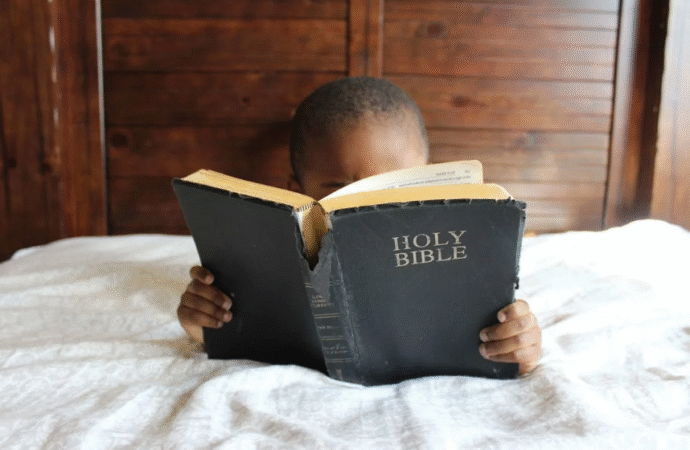It’s the National Day of Prayer, that one day a year that we seriously take a few minutes (or maybe not even that) to say a prayer that our nation will turn back to God and get serious about living right.
It’s a beautiful and good tradition – with leaders dating all the way back to the American founders, such as President John Adams, proclaiming “day[s] of solemn humiliation, fasting, and prayer” for the country and its inhabitants.
There’s no denying that America needs prayers. In fact, it’s quite evident that American society could use – and likely even wants – a religious infusion in general … but that infusion can’t come by just an annual recognition of spiritual things such as we have with the National Day of Prayer.
“Religion, in short, is the art of living day by day with God,” mid-20th century author Bernard Bell explained in his book, “Crisis in Education.” This art of living is acquired not so much by instruction at church, school – private or public – or society in general; instead, an understanding of spiritual matters and a knowledge of God is acquired chiefly through the family:
From the earliest days of Israel the duty of imparting to each oncoming generation the religious wisdom of the past has been given not to the state, not to the church, not to the school, not to priest or prophet or rabbi, but to the parents. It has been so in Christianity, too…. In the ‘days of faith’ Christian fathers and mothers were the teachers, aided by priests and other professional instructors; it was not the latter who were assisted by the former.
Bell concludes by offering the following warning:
When church and home forget their true relationship, at that instant Christianity ceases to manifest vitality and begins to degenerate into a less and less significant convention.
For parents already overwhelmed by the cares of feeding, clothing, educating and shuttling children to a myriad of activities, the idea that they are responsible for their child’s spiritual education – and by extension, the wellbeing of the nation – is overwhelming, particularly when many of today’s parents haven’t been raised with a religious understanding either.
For those who feel this way, Bell offers encouragement and some simple steps to take to begin incorporating religious instruction into the home.
1. The Simplicity of Spiritual Matters
We often get lost in what some call the “ups and downs and bells and smells” of religion. But religion’s “simple purpose is to bring together in mutual love human beings and God, God who is the beginning and the end, God with whom is purpose,” Bell says. In other words, if you can daily teach your children “to glorify God, and to enjoy Him forever,” you’re on the right track.
2. Time for Devotion
For those who don’t know where to start on spiritual training, Bell suggests committing to simple family devotions every day. This can be as simple as reading a Psalm or a Proverb after dinner, passing the Bible around so each family member has a chance to read, or perhaps studying a question from the catechism. Steady commitment to family devotions will show children that spiritual things are important, while also steadily growing their understanding of God and his ways.
3. Meaningful Prayers
“Training in religion cannot be reduced to the saying by a child of a hackneyed prayer or two before he goes to bed,” Bell writes. Sadly, “Now I lay me down to sleep” is the most introduction to home prayer that many children ever get.
Don’t let your home be that way. Yes, pray before bed and meals. But also pray after family devotions, asking for prayer requests and bringing them to God as a family unit. Pray before road trips. Pray for those who are sick. Pray for the tiny troubles that come up daily. Pray for the nation and its leaders, from the president on down to the school board. And don’t just leave it there. Look for ways God answers those prayers and share them with your family, pointing out that God is actively working on our behalf.
4. Attend Church
As Bell said previously, parents shouldn’t rely on pastors and Sunday school teachers to train their children in spiritual things, but a father’s “regular and humble attendance with his children at the ancient ceremonies” will make the Lord’s house a priority for a child. Staying afterwards and building relationships with others who are also seeking God will build a network of support that will encourage you and your children that you are not the only ones who make God a priority in their lives.
5. Talk About Spiritual Things
Ever at a loss as to what to talk about at dinnertime with your children? Talk about spiritual things – what you read in the Bible, how God is correcting or training you as a parent, ways that God answered your prayers – no matter how small. “The parental guide needs somehow to see to it that the children remain constantly aware of what religion is, that they do not forget that its simple purpose is to bring together in mutual love human beings and God,” Bell writes [emphasis added]. His advice echoes the biblical command to teach God’s words “diligently unto thy children,” talking of them in even the most mundane aspects of each day.
As our world devolves into chaos, many Americans are seeing the need to move away from the secular neutrality we’ve practiced in recent decades and instead plant the flag through spiritual grounding and Christian beliefs. Doing so is not as hard as we make it out to be. Introduce your children to spiritual things at a young age, model those same practices and beliefs yourself, and you just may play a key role in turning the tide on the despair that afflicts many in our nation today.
The National Day of Prayer is a good day to start.
—
The republication of this article is made possible by The Fred & Rheta Skelton Center for Cultural Renewal.
Image Credit: Pexels
28 comments















28 Comments
Sebastian
May 1, 2025, 4:01 pmThis is not just a job — it's freedom on your own terms! No interviews, no pressure, just results.
Apply now before it's too late 𝐒𝐚𝐥𝐚𝐫𝐲𝐇𝐞𝐫𝐞.𝐂𝐨𝐦
REPLYQueen Nielson@Sebastian
May 2, 2025, 6:12 pmStart now making every month extra $8000-$22000 or more by just doing an easy online work from home. Last month i have earned and received $19650 from this work by giving this only 3 hrs a a day.Every person can now get this work and start earning online by.
REPLYFor details check ——-⫸ https://Www.HighProfit1.Com
DeanGoodlet@Queen Nielson
May 5, 2025, 11:45 amRemote work isn’t just a trend, it’s the future of work. qs Work Remotely from your own house. We just want your typing skills, You can make more than 120USD/Hr. No matter where you are. Let’s Grow together and do great things, even if we’re far apart…
Take a Look………
Begin here>>>>>>>>> https://tinyurl.com/46fjveeh
REPLYJhon@Sebastian
May 3, 2025, 11:58 amEarn $1800+ Weekly from Home! A few months ago, I was stuck in a routine, barely making ends meet. Now, I earn $205+ a day working from home with complete flexibility! No experience? No problem. This is a real opportunity to build financial freedom on your terms.
Join now➤➤ https://www.jobs67.com
REPLYRhodora
May 1, 2025, 4:02 pmThank you for sharing this article. Religion should always be part of the family, schools and workplace.
REPLYDarlene@Rhodora
May 4, 2025, 11:37 pmI recently started working with Google remote jobs and I'm making around $550–$830 per week now. Honestly, I never thought it would be this easy to earn online. If anyone's serious, there are still openings available!
Get started today…..https://Www.Workapp1.Com/
REPLYSusan Bickford
May 1, 2025, 6:15 pmIt's A Great News to Celebrate with you Viewer, I am truly living the life I have been looking for after Dr Kachi made me win my Powerball Lottery, I had been playing for a good 8years. It was a friend of mine who directed me to Dr Kachi because my friend Nancy has won the Powerball so many times and I don't know how she got the match six numbers to play and win a very big amount of money, then the last time she won the Mega Millions I told her to tell me the secret on how she win. That's when she started telling me about the powerful Dr Kachi who has been her helper. and she gave me Dr Kachi Text/Call Number:+1 (209) 893-8075 I texted the greatest spell caster Dr Kachi and I told him I wanted to win my Powerball with his spiritual rightful number and he told me I should give him 2hours to get everything done and hopefully Dr Kachi do it, and give me a winning numbers to play my ticket that make me win the prize of $223.3 Million Dollars Powerball lottery Tuesday i bought the winning ticket at the Carlie C’s IGA store in Hope Mills, that changed my life for good today, and Dr Kachi a strong spell caster and trust him when he says the results will manifest it's Truth, God bless you Dr kachi for your kind help also can Email: [email protected]
REPLYPatriciaMKing@Susan Bickford
May 5, 2025, 2:58 amJOIN US Making cash is very easy an simple now days. 2025 is the year of making money online . I am here to tell you guys that its so easy to make more than $15k every month by working online. I have joined this job 3 months ago and on my first day of working without having any experience of online jobs I made $524. This is just amazing. Join this now by Follow instructions here………….. https://Www.Earn54.Com
REPLYHesterBrown@Susan Bickford
May 7, 2025, 10:11 amI have just received my 3rd payment order and $30,000 that I have built up on my laptop in a month through an online agent…!v76) This job is good and his regular salary is much better than my normal job. Work now and start making money online yourself.
REPLYGo here….… https://Www.Join.Work43.Com
Susan Bickford
May 1, 2025, 6:16 pmIt's A Great News to Celebrate with you Viewer, I am truly living the life I have been looking for after Dr Kachi made me win my Powerball Lottery, I had been playing for a good 8years. It was a friend of mine who directed me to Dr Kachi because my friend Nancy has won the Powerball so many times and I don't know how she got the match six numbers to play and win a very big amount of money, then the last time she won the Mega Millions I told her to tell me the secret on how she win. That's when she started telling me about the powerful Dr Kachi who has been her helper. and she gave me Dr Kachi Text/Call Number:+1 (209) 893-8075 I texted the greatest spell caster Dr Kachi and I told him I wanted to win my Powerball with his spiritual rightful number and he told me I should give him 2hours to get everything done and hopefully Dr Kachi do it, and give me a winning numbers to play my ticket that make me win the prize of $223.3 Million Dollars Powerball lottery Tuesday i bought the winning ticket at the Carlie C’s IGA store in Hope Mills, that changed my life for good today, and Dr Kachi a strong spell caster and trust him when he says the results will manifest it's Truth, God bless you Dr kachi for your kind help also can Email: [email protected]
REPLYSusan Bickford
May 2, 2025, 3:01 amIt's A Great News to Celebrate with you Viewer, I am truly living the life I have been looking for after Dr Kachi made me win my Powerball Lottery, I had been playing for a good 8years. It was a friend of mine who directed me to Dr Kachi because my friend Nancy has won the Powerball so many times and I don't know how she got the match six numbers to play and win a very big amount of money, then the last time she won the Mega Millions I told her to tell me the secret on how she win. That's when she started telling me about the powerful Dr Kachi who has been her helper. and she gave me Dr Kachi Text/Call Number:+1 (209) 893-8075 I texted the greatest spell caster Dr Kachi and I told him I wanted to win my Powerball with his spiritual rightful number and he told me I should give him 2hours to get everything done and hopefully Dr Kachi do it, and give me a winning numbers to play my ticket that make me win the prize of $223.3 Million Dollars Powerball lottery Tuesday i bought the winning ticket at the Carlie C’s IGA store in Hope Mills, that changed my life for good today, and Dr Kachi a strong spell caster and trust him when he says the results will manifest it's Truth, God bless you Dr kachi for your kind help also can Email: [email protected]
REPLY